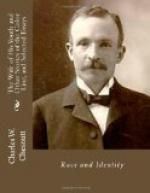country to rot in slavery for another generation.
White men do not thus argue concerning their own rights.
They know too well the value of ideals. Southern
white men see too clearly the latent power of these
unexercised rights. If the political power of
the Negro was a nullity because of his ignorance and
lack of leadership, why were they not content to leave
it so, with the pleasing assurance that if it ever
became effective, it would be because the Negroes
had grown fit for its exercise? On the contrary,
they have not rested until the possibility of its
revival was apparently headed off by new State constitutions.
Nor are they satisfied with this. There is no
doubt that an effort will be made to secure the repeal
of the Fifteenth Amendment, and thus forestall the
development of the wealthy and educated Negro, whom
the South seems to anticipate as a greater menace
than the ignorant ex-slave. However improbable
this repeal may seem, it is not a subject to be lightly
dismissed; for it is within the power of the white
people of the nation to do whatever they wish in the
premises—they did it once; they can do it
again. The Negro and his friends should see to
it that the white majority shall never wish to do
anything to his hurt. There still stands, before
the Negro-hating whites of the South, the specter
of a Supreme Court which will interpret the Constitution
to mean what it says, and what those who enacted it
meant, and what the nation, which ratified it, understood,
and which will find power, in a nation which goes
beyond seas to administer the affairs of distant peoples,
to enforce its own fundamental laws; the specter, too,
of an aroused public opinion which will compel Congress
and the Courts to preserve the liberties of the Republic,
which are the liberties of the people. To wilfully
neglect the suffrage, to hold it lightly, is to tamper
with a sacred right; to yield it for anything else
whatever is simply suicidal. Dropping the element
of race, disfranchisement is no more than to say to
the poor and poorly taught, that they must relinquish
the right to defend themselves against oppression until
they shall have become rich and learned, in competition
with those already thus favored and possessing the
ballot in addition. This is not the philosophy
of history. The growth of liberty has been the
constant struggle of the poor against the privileged
classes; and the goal of that struggle has ever been
the equality of all men before the law. The Negro
who would yield this right, deserves to be a slave;
he has the servile spirit. The rich and the educated
can, by virtue of their influence, command many votes;
can find other means of protection; the poor man has
but one, he should guard it as a sacred treasure.
Long ago, by fair treatment, the white leaders of
the South might have bound the Negro to themselves
with hoops of steel. They have not chosen to take
this course, but by assuming from the beginning an
attitude hostile to his rights, have never gained
his confidence, and now seek by foul means to destroy
where they have never sought by fair means to control.




